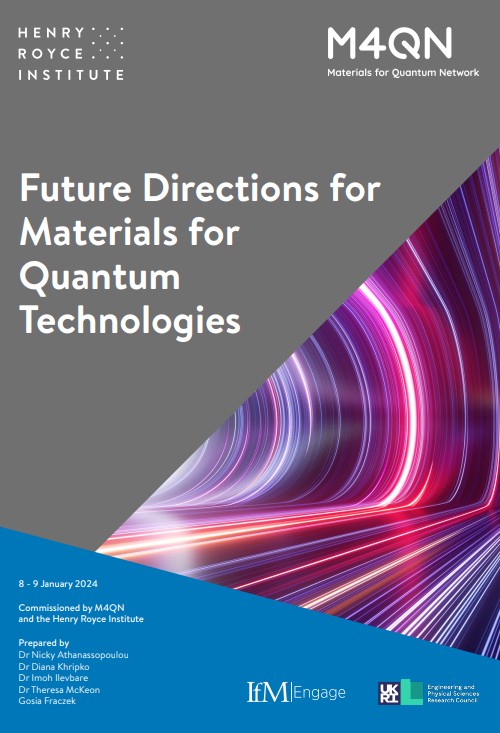Unlocking the potential of Materials for Quantum Technologies in the UK
Materials for Quantum Network (M4QN)
Our roadmapping workshops are an excellent tool for the development and communication of strategy and innovation. They combine flexibility and adaptability with a structured approach to gathering perspectives and opinions of large groups of participants from diverse backgrounds, bringing clarity to complex problems. The workshops utilise a consensus-driven approach to decision-making and visual tools to keep all stakeholders on the same page and ensure alignment of priorities and actions.
Impact
Identified key challenges and material development priorities across quantum technologies (QTs) in Computing and Communications; Sensing and Imaging; and Positioning, Navigation and Timing, underscoring important areas for research and investment.
Identified critical gaps in capabilities and infrastructure. Drawing on expertise from over 80 QT professionals, the findings emphasise the skills and training gaps and the need for policy, infrastructure and funding to ensure the success of the QT economy in the UK.
Supported collaboration, open dialogue and alignment on priorities among academia, industry and government, culminating in a strategic vision with actionable plans for the future of the QT industry in the UK.
The challenge
Quantum technologies (QTs) use the principles of quantum physics to create new and exciting applications in many areas. By taking advantage of quantum effects, researchers are building technologies that have improved performance over existing systems. For instance, in computing, quantum bits (qubits) can perform complicated calculations much faster than traditional computers. Additionally, quantum sensors can achieve higher precision and sensitivity than regular sensors.
According to the UK’s National quantum strategy, it is expected that countries that develop and use QTs will have advantages in terms of economic growth, health, sustainability and national security and resilience, with a vision “for the UK to be a leading quantum-enabled economy, recognising the importance of QTs for the UK’s prosperity and security”.
In June 2022, the Engineering and Physical Sciences Research Council (EPSRC) announced funding to launch the Materials for Quantum Network (M4QN). This interdisciplinary network connects experts from academia, start-ups, and industry, fostering collaboration to create a unified approach for advancing the quantum technologies sector in the UK.
To support the UK’s National Quantum Strategy and create a strong, cohesive strategy to fulfil their mission, the network commissioned IfM Engage to facilitate a roadmapping workshop with three main objectives:
-
- Identify, prioritise and assess the main challenges for QT’s in the areas of Computing and Communications, Sensing and Imaging, and Positioning, Navigation, and Timing (PNT).
- Identify the future directions for QT materials to support and solve the most pressing challenges.
- Create a document linking materials capabilities to scientific applications in alignment with the UK’s National Quantum Strategy, to serve as a communication tool for policymakers and highlight priority areas for funding and investment.
The approach
IfM Engage conducted a two-day roadmapping workshop in January 2024, bringing together 81 participants from academia, industry, and government. The workshop aimed to foster collaboration, discussion, and strategic planning for the future of the materials required for the QT industry in the UK. It provided a platform for diverse stakeholders to share their perspectives, aligning them towards the common goal of prioritising the future directions of QT materials in the UK.
Drawing on 25-years of roadmapping experience from the Institute for Manufacturing (IfM) at the University of Cambridge, the workshop was specifically designed to explore the key themes of challenges and material developments in the context of three technology areas: Quantum Computing and Communications; Quantum Sensing and Imaging; and Quantum Positioning, Navigation and Timing.
To guide discussions, 80 challenges were identified through desk research and participant input prior to the workshop across the Computing and Communication Sensing and Imaging areas. During the workshop the participants reviewed, edited, and prioritised the lists, resulting in a set of ranked challenges for each area and three overarching challenges. The outputs from the workshop are collated and analysed, with each technology area reported separately.


Impact
The roadmapping workshop established a shared vision for the future of materials for QTs in the UK. By integrating the insights and perspectives of more than 80 experts from all areas of the field through a structured and iterative process, the final report and its recommendations offer a thorough and influential strategy for advancing quantum technologies. The main outcomes include:
-
- Identification of the key challenges across the three QT areas analysed. Common challenges include the need for advanced characterisation capabilities, micro and nanofabrication techniques for precise functionality, and effective integration of solid-state quantum devices with photonic networks.
- Prioritisation for material development. Critical material development areas involve efficient photonic integration of quantum emitters, ensuring high material quality and defect control, and discovering new qubit systems through innovative growth techniques and automated characterisation methods.
- Outlining the skills and infrastructure needed for success. The report highlighted the pressing need for skilled researchers, with initiatives to attract and train new talent in QTs. Strong infrastructure, including advanced laboratories and fabrication facilities, is essential for the UK’s technological leadership. Funding for personnel, research, and equipment, along with interdisciplinary collaboration, is vital for progress in this rapidly evolving field.
